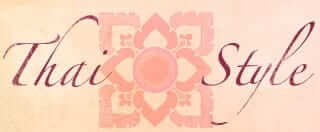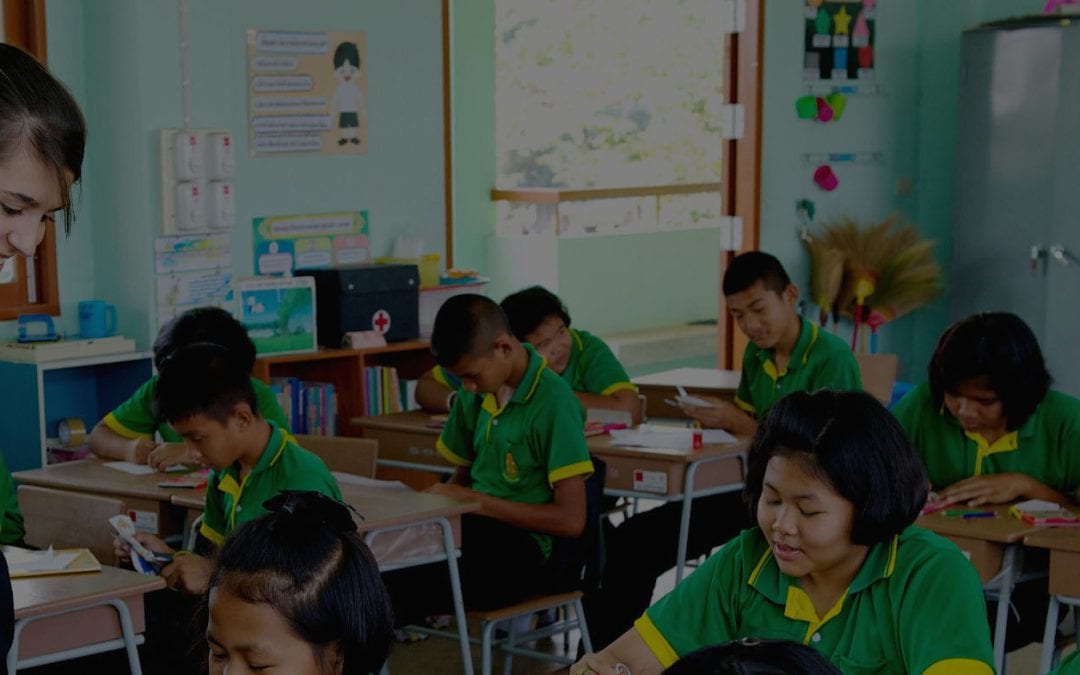Learn Thai with Kruu Jiab
วันเด็ก(แห่งชาติ) : Wun Dè’k (Hàeng Chàad) : day + child + (of + nation)National Children’s Day is on the second Saturday of January each year. The holidays are not compensated in the next workday. With the slogan children every year by Prime Thailand.
Let’s learn common words that are used with children, young person and more.
Vocabulary & Audio:
ลูก : Lûuk = [noun] offspring, son or daughter e.g. เขามีลูก : Kăo Mee Lûuk = He/she has (a) child/children.ลูกชาย : Lûuk~Chaay = [noun] male offspring, son e.g. เขามีลูกชาย : Kăo Mee Lûuk~Chaay = He/she has (a) son(s).
ลูกสาว : Lûuk~Săaw = [noun] female offspring, daughter e.g. เขามีลูกสาว : Kăo Mee Lûuk~Săaw = He/she has (a) daughter(s).
เด็ก : Dè’k = [noun] child, kid, young person e.g. เด็กกำลังเล่น : Dè’k Gum-lung Lê_n = Child/children is/are playing. (กำลัง : Gum-lung = -ing; currently taking place)
เด็กผู้ชาย : Dè’k~Pûu+Chaay: child~person+male = [noun] boy, young male e.g. เด็กผู้ชายกำลังวิ่งเล่น : Dè’k~Pûu+Chaay Gum-lung Wîng~Lê_n = The boy(s) is/are running around. (วิ่งเล่น : Wîng~Lê_n = running for fun/pleasure)
เด็กผู้หญิง : Dè’k~Pûu+Yĭng : child~person+female = [noun] girl, young female e.g. เด็กผู้หญิงกำลังเล่นของเล่น : Dè’k~Pûu+Yĭng Gum-lung Lê_n Kŏrng~Lê_n = (The) girl(s) is/are playing with toy(s). (ของเล่น : Kŏrng~Lê_n = thing(s) to play with, toy)
เด็กชาย : Dè’k~Chaay : child~male = [title] master e.g. เด็กชายมานพ เจริญพร : Dè’k~Chaay Maa-nó’b Jà-rern~Porn = Master Manop Chareonphon
เด็กหญิง : Dè’k~Yĭng : child~female = [title] miss (for girl only) e.g. เด็กหญิงดารา ชนะชัย : Dè’k~Yĭng Daa-raa Chà-ná~Chai = Miss Dara Chanachai
เด็กแรกเกิด : Dè’k~Râek~Gèrd : child~primary/initial/first~be born เด็กแรกคลอด : Dè’k~Râek~Klôrd : child~primary/initial/first~to delivery (baby)
= [noun] newborn baby
เด็กแดง : Dè’k~Dâeng : child~red (complexion) เด็กอ่อน : Dè’k~Òrn : child~immature/young/tender (เด็ก)ทารก : (Dè’k)~Taa-ró’k : child~infant/baby
= [noun] newborn baby, infant (up to 24 months)
e.g. พวกเขามีเด็กอ่อน : Pûak~Kăo Mee Dè’k~Òrn : group~third person=they + to have + infant = They have an infant (with them)
เด็กน้อย : Dè’k~Nói : child~little = [noun] infant, baby (In relationship, man can use this word to call their partner as baby) e.g. เด็กน้อยคนนี้น่ารัก : Dè’k~Nói Ko’n Née Nâa+Rúk : baby + unit word of human/person + this + be cute/lovely = This baby is cute.
เด็กเล็ก : Dè’k~Lé’k : child~small = [noun] small child, toddler age up to 4/5 years old e.g. โรงเรียนสอนเด็กเล็ก : Rong~Rean Sŏrn Dè’k~Lé’k : school + to teach + small children = nursery school
เด็กโต : Dè’k~Dto : child~grow up = [noun] grown up child, 4/5 up to 12/13 years old e.g. นมผงสำหรับเด็กโต : No’m~Pŏ’ng Sŭm-rùb Dè’k~Dto : milk~powder/dust (powdered milk) + for (function/natural purpose) + grown up child
เด็กก่อนวัยเรียน : Dè’k~Gòrn~Wai~Rean : child~before~age~to study/learn = [noun] pre-school child
เด็กวัยเรียน : Dè’k~Wai~Rean : child~age~to study/learn = [noun] school age child
เด็กนักเรียน : Dè’k~Núk+Rean : child~person+to study/learn = [noun] school child, young student, young pupil
เด็กประถม : Dè’k~Bprà-tŏ’m : child~primary school = [noun] primary school age child
เด็กมัธยม : Dè’k~Múd-tà-yo’m : child~secondary school = [noun] secondary school age child
เด็กมหาลัย : Dè’k~Má-hăa-lai : child~university = [noun] university student (มหาลัย : Má-hăa-lai is an elision of มหาวิทยาลัย : Má-hăa-wìt-tá-yaa-lai)
เด็กช่าง : Dè’k~Châang : child~mechanic = [noun] polytechnic college student (particularly used to call a group of polytechnic college student who are in a gang)
(เด็ก)วัยรุ่น : (Dè’k)~Wai~Rôon : (child)~age~youth/adolescent = [noun] teenage
เด็กหนุ่ม : (Dè’k)~Nôom : (child)~youth/adolescent = [noun] adolescent man
เด็กสาว : (Dè’k)~Săaw : (child)~youth/adolescent = [noun] adolescent woman
Describing Children:
เด็กดี : Dè’k Dee : child + be good/nice = well behave child
เด็กดื้อ : Dè’k Dûee : child + be disobedient/stubborn = naughty child
เด็ก(ซุก)ซน : Dè’k (Sóok)~So’n : child + be mischievous/troublesome = mischievous child
เด็กขยัน : Dè’k Kà-yŭn : child + be diligent = diligent child
เด็กขึ้งอแง : Dè’k Kêe~Ngor-ngae : child + be petulant/be peevish = petulant child
เด็กขี้แย : Dè’k Kêe~Yae : child + be winning/tearful/weepy = whining child
เด็กเรียน : Dè’k~Rean : child + to study/learn = nerdy (child)
เด็กฉลาด : Dè’k Chà-làad : child + be clever/intelligent = clever child
เด็กแก่น(แก้ว) : Dè’k Gàen~(Gâew) : child + be mischievous = mischievous child (particularly used to describe girls)
เด็กออทิสติก : Dè’k Or-tíd-dtìk : child + be autistic = autistic child
เด็กกล้าแสดงออก : Dè’k Glâa Sà-daeng~Òrk : child + be daring + to express (oneself) = confident child
เด็กขี้อาย : Dè’k Kêe+Aay/Aai : child + be shy = bashful child
เด็กช่างพูด/คุย : Dè’k Chàang+Pûud/Kui : child + be talkative/be smart in talking = talkative child (particularly when they say something smart)
เด็กไร้เดียงสา : Dè’k Rái~Deang-săa : child + be naive = naive child
เด็กไม่รู้ประสีประสา : Dè’k Mâi Rúu Bprà-sĕe-bprà-săa : child + no/not + to know + ways of the world/conduct/manner = innocent child
เด็กเหลือขอ : Dè’k Lŭea~Kŏr : child + lelt over~to request (be incorrigible) = incorrigible child, brat
เด็กโง่ : Dè’k~Ngôo : child + be stupid/silly = [noun] silly child [idiom] say when a young person or in a relationship man says to woman when they did something silly or misunderstood something
เด็กโข่ง : Dè’k~Kean : child + apple snail = [slang] school child that fail to move up the class (Thais compare these kids as they are big and slow as apple snail)
เด็กเกรียน : Dè’k~Grean : child + closely cropped (of hair cut) = [slang] young person that has disruptive behaviour, offensive speech and illogical idea or think of themselves as the centre of society. They usually express themselves with emotion rather than rational thoughts or analysis.
เด็กแว้น: Dè’k~Wáen : child + sound of moped revs = [slang] young man that likes to wander around at night with a moped and rev the moped to sound ‘แว้นๆ : Wáen Wáen’. เด็กแว้น: Dè’k~Wáen have their own culture and style.
เด็กสก๊อย : Dè’k~Sà-gói : child + – = [slang] young enthusiast, esp. girl, who are in the cult of เด็กแว้น: Dè’k~Wáan, usually their girlfriends, sitting as passenger on moped.
เด็กเมื่อวานซืน : Dè’k Mûea~Waan~Sueen : child + day before yesterday = inexperienced child (particularly used to insult someone or condemn or teach young person as being inexperience)
e.g. ไอ้เด็กเมื่อวานซืน เถึยงผู้ใหญ่ : Âi Dè’k Mûea~Waan~Sueen Tĕang Pûu+Yài : male impolite title + child + day before yesterday + debate/argue + grown up/adult
เด็กอมมือ : Dè’k O’m Muee : child + to suck + hand = [idiom] innocent/naive child (particularly used to compare an adult acting as if an innocent child)
e.g. อย่าทำตัวเป็นเด็กอมมือ : Yàa Tum Dtua Bpe’n De’k O’m Muee : don’t + to make/do + to be (status) + child + to suck + hand
= Don’t acts as if you are an innocent/naive child. / Don’t acts like a baby!
ท้องฟ้า : Tórng~Fáa = [noun] sky (combined from the word ‘ท้อง : Tórng = [noun] stomach [noun] vast area’ and ‘ฟ้า : Fáa = [noun] light blue, sky blue [noun] sky)
Post By ครูเจี๊ยบ : Kruu Jíab
Follow Kruu Jiab for free Thai language updates here



